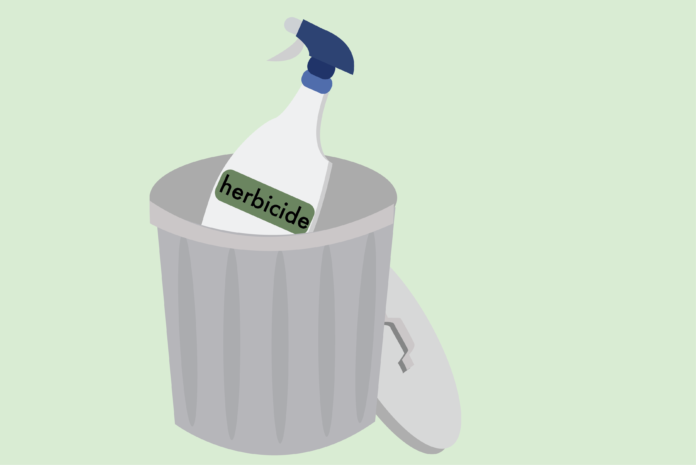Grounds department already taking steps to minimize herbicide usage
The ASUCD Environmental Policy and Planning Commission (EPPC) is making progress towards making UC Davis a herbicide-free campus. This initiative follows in the footsteps of the Herbicide-Free Cal campaign, which started after two UC Berkeley volleyball players discovered the use of Monsanto’s RangerPro on the field surrounding their volleyball courts in 2017.
Herbicides destroy unwanted vegetation, such as weeds, through a complex mix of chemicals, with glyphosate almost always being an essential ingredient. Glyphosate is listed under Proposition 65 as a chemical known to the state of California to cause cancer. Monsanto’s RangerPro, along with many other commonly used herbicides, contains this hazardous chemical.
UC Davis uses Monsanto products all over campus, except for its athletic fields. UC Davis has had Monsanto representatives on its advisory board, according to a Food and Water Watch report on corporate influence on university agricultural research.
Monsanto’s name is often in the news, most recently in a court case where a federal jury ordered the company to pay more than $80 million in damages. It was determined that the company’s product Roundup partially caused a California man’s cancer.
Alice Beittel, the chair of the EPPC and prominent leader of the movement, further discussed the process of transitioning UC Davis into a herbicide-free environment. She explained that this campaign is part of a larger movement of students working together to eliminate toxic herbicides from all UC campuses.
“We are partnering with other UC campuses and Food and Water Watch,” Beittel said via email. “Working with students at Herbicide-Free UC campaigns at UC Berkeley, UC Riverside, and UCLA, we are pushing for an herbicide-free UC system and calling on the University of California to join the long list of our fellow research institutions that have already reduced or eliminated the use of herbicides on campuses.”
According to Tyson Mantor, the superintendent of Student Housing and a key member of the grounds and landscape services team at UC Davis, these efforts have been successful. Mantor said that the University of California Office of the President (UCOP) has recognized these concerns coming from various UCs, and they are trying to create a universal policy towards reducing and potentially eradicating herbicide use for the entire system.
“We’ve been working very hard, as have all the UCs and the industry in general, to try and take a more sustainable perspective,” Mantor said. “For example, we’ve made the promise that, excluding sports turf, across campus we will only use 100% organic fertilizers […] We have also implemented a process of applying — I think we’re almost at 1,000 yards — mulch across campus, to try and bring our herbicide or sprayed chemical use down.”
These efforts have not been mandated by the UCOP, which is still trying to figure out what kind of policies to implement and when. These actions are simply UC Davis’ independent method of taking initiative to lower their chemical usage.
Mantor noted that he had heard of the EPPC’s initiative and believes that UCOP’s newfound mission to eliminate herbicides is a direct effect of the EPPC’s proposals.
Beittel expressed her appreciation for the grounds teams’ work towards a cleaner campus. She noted several different methods they’re experimenting with, including aeration and composting.
“UC Davis groundskeeping has already been stepping up the transition off of herbicide use and to organic management practices,” Beittel said via email. “If you see large piles of much around campus, you are witnessing first hand an effort to reduce weeds and soil erosion through increased mulching. [They] are also testing out compost tea applications to increase the bioactivity of soils […] If you saw many small holes drilled into the main quad’s soil, this is an effort to aerate the soil to create an environment that is a better fit for grass than weeds.”
Caroline Newell, the president of the Environmental Club at UC Davis, feels not enough students are aware of the extent of herbicide use on their campus. She suggested a few simple solutions — Davis can either hire individuals to tend to the weeds, instead of using hard chemicals to treat them, or opt for a more natural substance.
“I think maybe the better way to do herbicide treatment would be to use naturally derived, organic herbicide treatments,” Newell said. “Personally, I’m not completely anti-chemical use. I think that when you have an invasive species, you have to do integrated pest management, which is, you use chemicals but you use them the least amount possible.”
Newell suggested that pairing integrated pest management with a hands-on weeding approach may be the best way to approach the situation.
Written by: Claire Dodd — campus@theaggie.org




